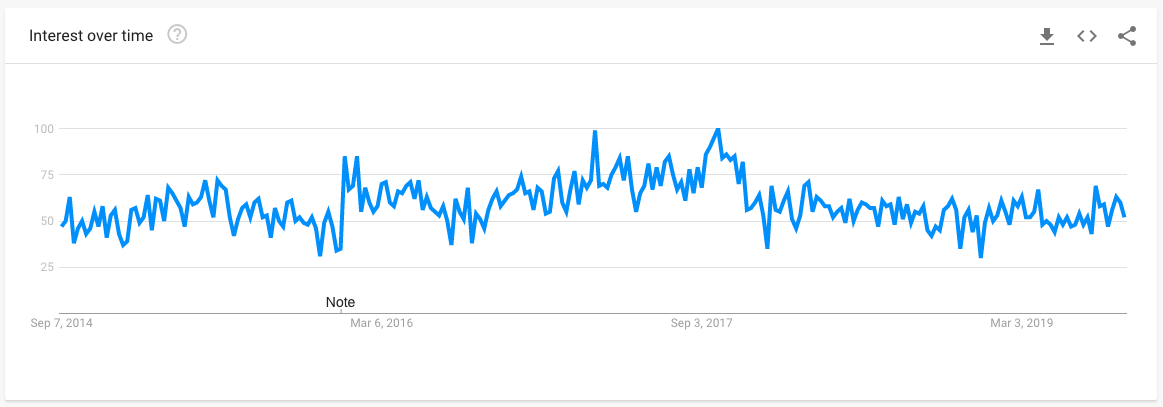Did you know that CRM software is one of the biggest software markets in the world? One of the biggest factors behind it’s growth is companies wanting to quickly access customer data, and use it for effective customer service, email marketing and personalization.
Businesses now expect to be able to use technology to improve their client relationships. The outcome is an increase in popularity for CRM software:

(Data from Google Trends) And the industry is still growing. What’s exactly CRM? Customer Relationship Management. A tool that manages all your interactions with existing customers and potential customers. The software is a centralized hub to access all the important information regarding customers to deliver them a delightful experience. Some studies claim that CRM is expected to reach more than $80 billion in revenue by 2025. To help you understand more about the CRM industry, we’ve pulled together this list of CRM statistics that help showcase the software’s popularity, as well as the potential benefits to your business. Whether you are on the lookout for your first CRM or looking for an upgrade, this data-driven blog post will help you in your research to find the best CRM. Ready? Let’s go.
General CRM Statistics
- 46% of sales teams report extensive use of CRM systems. (Entrepreneur, 2018)
- The global CRM software market is valued at whopping $120 billion. (Forbes, 2018)
- 22% of salespeople don’t actually know what a CRM is. (Hubspot)
- 40% of salespeople don’t use a CRM. Instead they use methods like spreadsheets and emails to store valuable customer data. (Hubspot)
- In 2018, 13% of companies say investing in a CRM is a top priority for sales this year. (HubSpot, 2018)
- 65% of companies start using a CRM system within the first five years of business. (Capterra)
- In 2021, 87% of businesses access the CRM system through a cloud-based solution using multiple devices, like laptops, desktops, smartphones, and tablets. This number was 12% in 2008 as businesses earlier preferred on-premise solutions. (Software Advice)
Statistics on Benefits of CRM Software
- The average return on investment (ROI) on CRM software is $8.71 for every dollar spent. (Nucleus Research)
- Effective sales teams are 81% more likely to be consistent CRM users. (Aberdeen Group)
- CRM software can help to increase sales by up to 29%, as well as improve sales productivity by up to 34% and sales forecasting accuracy by 42%. (Salesforce)
- 74% of CRM users said that their CRM gave them improved access to important customer data. (Software Advice)
- On average, improved data accessibility offered by a CRM can reduce the sales cycle by 8–14%. (Nucleus Research)
- CRM decision-makers claim a productivity gain of 14.6% from mobile CRM capabilities and 11.8% from social CRM. (Nucleus Research)
- 24% more sales reps will achieve their annual sales quota thanks to mobile CRM access. (Aberdeen Group)
- 47% of CRM users said that it’d had a significant impact on customer retention. (Nutshell)
- 47% of users said that their CRM had a strong impact on customer satisfaction. (Capterra)
CRM Sales Statistics
- 75% of companies say that closing more deals is a top priority this year. (HubSpot)
- 48% of companies say that improving the efficiency of sales funnels is a top sales priority. (HubSpot)
- 69% of companies say that turning contacts into customers is a top marketing priority. (HubSpot)
- 44% of companies say that increasing revenue from pre-existing customers is a top marketing priority. (HubSpot)
- 37% of companies say that sales enablement is a top marketing priority. (HubSpot)
- 40% of companies say that getting a response from prospects is more difficult now than it was 3-4 years ago. (HubSpot)
- 31% of companies say that engaging in multiple company decision-makers in the buying process is more difficult now than 3-4 years ago. (HubSpot)
- 30% of companies say that closing deals are more difficult now than 3-4 years ago. (HubSpot)
13% of companies say that the daily use of sales technologies is more difficult now than 3-4 years ago. (HubSpot)
Other CRM Statistics
- The global healthcare CRM market was worth $7.27 billion in 2017 and is projected to grow to $28.89 billion by 2026. (Business Wire)
- Salesforce, the largest provider of CRM software, increased its revenue by 26 % in 2017. (Entrepreneur)
- CRM software leads the technology investment as 44% of businesses are planning to increase their IT budgets in 2021. (Spiceworks)
- Salesforce claimed 19.6% of the global CRM market share in 2017. (Forbes)
- US businesses are likely to spend more than $350 million on email advertising, making CRM a crucial part of the email marketing strategies. (Business2community)
- Oracle has the second-largest share of the global CRM market, claiming a 7.1% market share in 2017. (Forbes)
- SAP SE has the third-largest share of the global CRM market, claiming a 6.5% market share in 2017. (Forbes)
What 2021 Holds for Customers?
Well, 2021 is again the year of the customer. With customers having a lot of choices online before finalizing on a product or service, it is important for your business to manage customer contacts and establish a delightful relationship with them. For that, your representatives would need a CRM software to get a 360-degree view of your customers to connect with them. Hopefully, these CRM statistics will be useful to move your business in the right direction, i.e., towards a customer-centric environment. Aside from analyzing these CRM statistics and keeping up-to-date on industry trends, you should also check out this handy CRM comparison spreadsheet to help in your decision-making.
FREE. All Features. FOREVER!
Try our Forever FREE account with all premium features!







